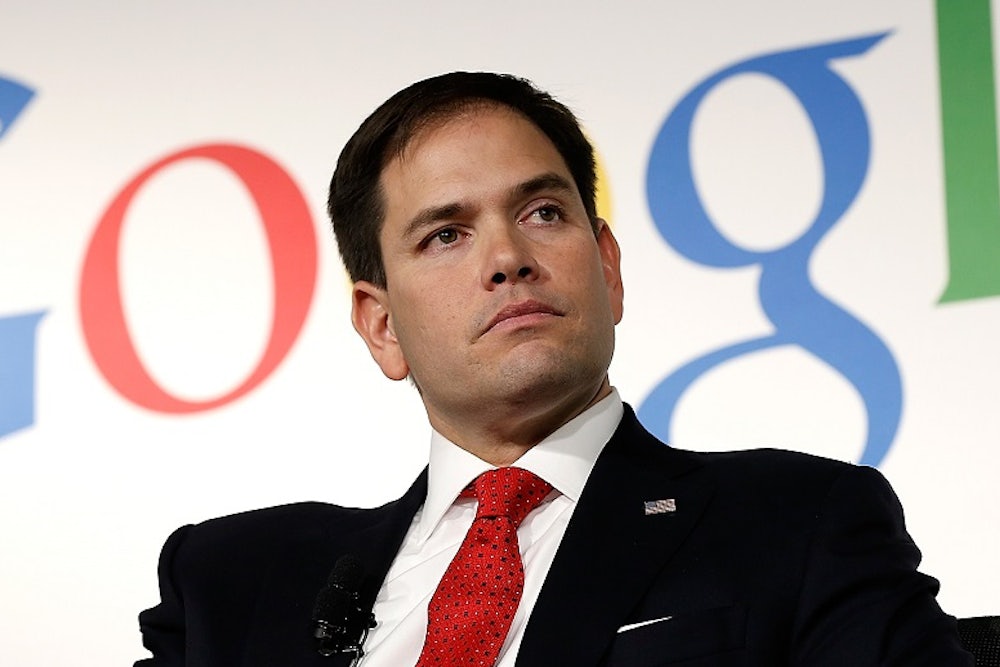Republicans like to talk about government in the broadest, most abstract terms—arguing that it's too big, too intrusive, and too expensive. The argument plays well politically, since the public tends to agree. But it also allows Republicans to avoid talking about real trade-offs—like the fact that government unemployment checks help people pay their bills while they are out of work, or that government guidelines for product safety keep kids safe when they play with toys. So perhaps it's no surprise that the latest big idea from Republicans is a "national regulatory budget"—a proposal by Senator Marco Rubio that, however sensible sounding, could force government to scale back protections that people very much need.
Under Rubio’s plan, an independent agency would calculate the economic costs of all existing regulations. Congress would then set an upper limit on how much regulations can cost the economy—and use that figure to establish caps for each individual federal agency. What would that mean in practice? Imagine that the Environmental Protection Agency wanted to impose a new regulation on pollution. If the EPA was already at its limit, it would have to rescind an old regulation (or regulations) in order to make room.
“The essence of this proposal is a budget accounting mechanism—a one in requires one out. So one regulation in requires a similar regulation to be repealed,” said Amit Narang, a policy advocate at Public Citizen and an expert on the federal regulatory process. “The premise of the legislation is that we are currently at the perfect level of regulation. We don’t need anymore.”
One of Rubio's goals is to force regulatory agencies to go back through old regulations and eliminate outdated and costly ones. There's a strong case for that: Government agencies don’t do this very often and plenty of duplicative, cumbersome regulations exist. But Rubio’s method for forcing agencies to review past regulations is clumsy—and, according to many experts, dangerous. Among other things, the plan requires agencies to eliminate a regulation (or regulations) with the same economic cost as the new one. If the EPA wants to impose a major regulation (such as one on coal-fired power plants), it would have to rollback a significant one in return. “It’s not out of the realm of possibility to imagine this kind of budgetary system resulting in, say, the EPA, in order to put forward new chemical regulations—maybe they would have to repeal old lead regulations,” Narang said.
Rubio seems to think that Congress can set an arbitrary cap on the burden of regulations, at the precise level where agencies can ensure public safety without unduly hurting the economy. “This would force federal agencies to enact only those regulations that truly serve an essential role,” Rubio said in a speech at Google’s Washington D.C. headquarters on Monday. “It would put in place and enshrine the cost-benefit analysis and the regulatory framework that we are lacking right now.” Rubio is right that under his plan, federal agencies would have to evaluate their regulations and repeal the ones that had the worst cost-benefit ratio. But Congress could easily set the cap at a level which would force agencies to eliminate regulations whose benefits exceed their costs. That's a dangerous unintended (or maybe intended) consequence of his proposal.
The ultimate problem with Rubio's plan is that it actually has nothing to do with cost-benefit analysis. On the contrary, it sets a cap based solely on the economic costs of regulations, regardless of their benefits. Rubio wants agencies to evaluate the current costs and benefits of old regulations (they already do so with new ones), but he wants to ensure that even if the benefits exceed the costs, federal agencies will be forced to do away with many regulations anyway. Rubio says he wants to ensure a rigorous analysis of our regulatory system. What he really wants to do is rig the game.
